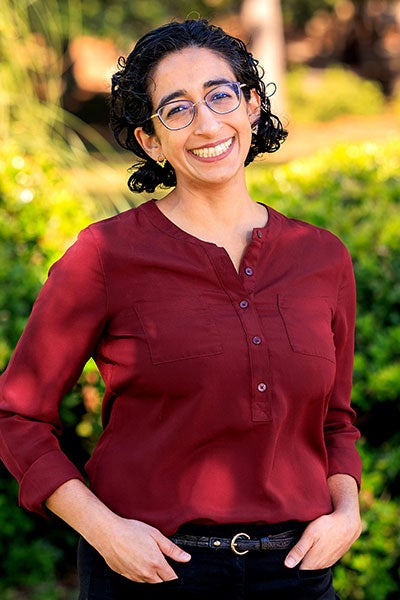Environmental health researcher tackles medical school
Radhika Dhingra already had the letters ‘Dr.’ before her name before she stepped foot into the Brody School of Medicine as an East Carolina University student.

Brody School of Medicine student Dr. Radhika Dhingra
Born and raised in Houston, Dhingra lived in Texas for her first 26 years, completing undergraduate schooling in architecture and math. She then collected advanced degrees in Atlanta: master’s degrees in environmental engineering and environmental health and epidemiology, and then a doctorate in environmental health at Emory University.
As a public health researcher with the U.S. Environmental Protection Agency and at UNC-Chapel Hill, she put her education to work investigating the impacts of air pollution and wildfire smoke on children’s health.
“Wildfires are proliferating all over the world. They’re certainly doing more damage than just to people’s property or land,” Dhingra said. “They are definitely doing damage to our mental health as well as our physical health; that includes impacts on our lungs.”
Dhingra said that there has been growing research on the acute respiratory effects of wildfire smoke on adults and children, but long-term respiratory effects of wildfire smoke on infants is scant. There is decent evidence that air pollution, by way of vehicle exhaust and other particulate matter, is bad for kids, but the long-term effects of wildfires remain woefully understudied.
Dhingra is the lead author on a recently published study which found evidence that wildfire smoke exposure in the six months after birth causes a longer term effects on the respiratory health of children, which is seemingly intuitive. A surprising twist in the findings of Dhingra’s study is that the upper respiratory system – from the nose down to the larynx – was primarily impacted by the smoke, which presents a particular challenge for babies.
“As a doula, I remember training moms not to obstruct the baby’s nose while breastfeeding because that’s how they breathe,” Dhingra said. “Newborn babies have to breathe out of their nose — they don’t have a choice.”
Dhingra said she knows people think she is crazy for taking on medical school, but she is fundamentally interested in how people become sick and wants to combine her training in epidemiology with the practice of medicine to improve the health of marginalized populations who too often are disproportionately affected by environmental pollution and climate change.
She applied during the COVID-19 pandemic to get a sense of how the process of applying to medical schools worked so that she would be prepared for the future, not imagining that she might be selected.
The leap from public health to medicine isn’t big, but it was still a risk and a significant commitment, not only for her as a student, but also for her family.
Dhingra is a non-traditional medical student, with a husband and a young child to consider and a career that includes ongoing research with some of North Carolina’s marginalized populations, so staying in North Carolina was an important part of her decision to undertake the program. As important, Dhingra said, was the feeling of being welcomed as a person by Brody’s leadership, particularly Dr. Cedric Bright, the vice dean for medical education and admissions.
“Dr. Bright called us directly and that means the deans directly care about the students.” Dhingra said. “Medicine attracts so many high achievers. But here at Brody, I feel like here you get to be a person before an achievement machine.”
Brody’s leadership is committed to building a sense of family within the medical school, which Bright said starts with the very first interaction that he has with students admitted to the program.
“At BSOM we believe in the personal touch when informing students of their milestone of admission. It validates how much we want our students here to be part of the Brody family,” Bright said. “When a family member has good news they pick up the phone instead of sending an email.”
Bright said that Dhingra is an exceptional person and the kind of student he is proud to have as part of the medical school.
“Radhika is worthy of praise. I think she’ll be a great ambassador for Brody — she already is,” Bright said.
MORE BLOGS
